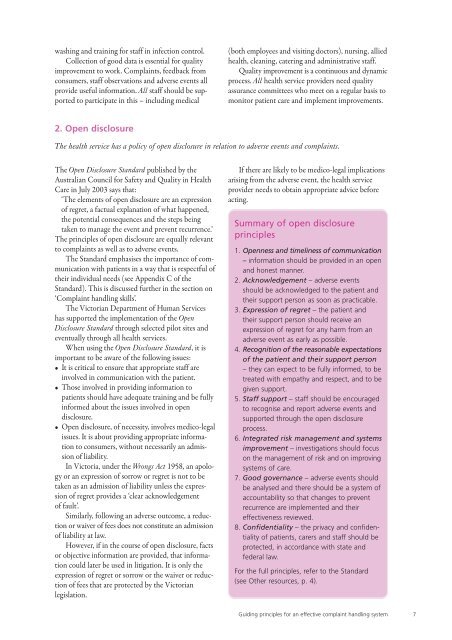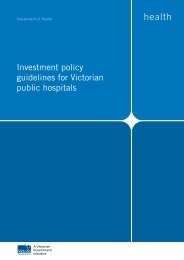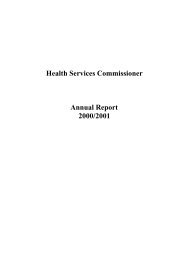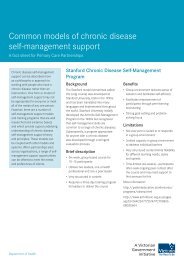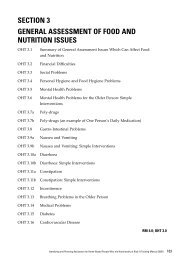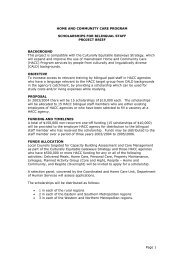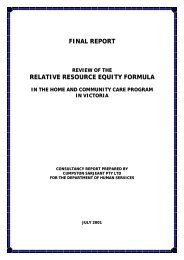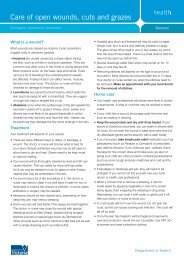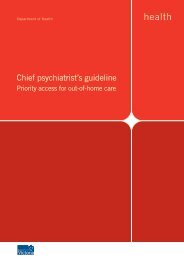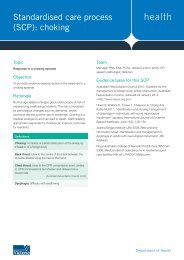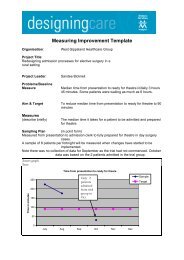Guide to Complaint Handling in Health Care Services
Guide to Complaint Handling in Health Care Services
Guide to Complaint Handling in Health Care Services
You also want an ePaper? Increase the reach of your titles
YUMPU automatically turns print PDFs into web optimized ePapers that Google loves.
wash<strong>in</strong>g and tra<strong>in</strong><strong>in</strong>g for staff <strong>in</strong> <strong>in</strong>fection control.<br />
Collection of good data is essential for quality<br />
improvement <strong>to</strong> work. <strong>Compla<strong>in</strong>t</strong>s, feedback from<br />
consumers, staff observations and adverse events all<br />
provide useful <strong>in</strong>formation. All staff should be supported<br />
<strong>to</strong> participate <strong>in</strong> this – <strong>in</strong>clud<strong>in</strong>g medical<br />
(both employees and visit<strong>in</strong>g doc<strong>to</strong>rs), nurs<strong>in</strong>g, allied<br />
health, clean<strong>in</strong>g, cater<strong>in</strong>g and adm<strong>in</strong>istrative staff.<br />
Quality improvement is a cont<strong>in</strong>uous and dynamic<br />
process. All health service providers need quality<br />
assurance committees who meet on a regular basis <strong>to</strong><br />
moni<strong>to</strong>r patient care and implement improvements.<br />
2. Open disclosure<br />
The health service has a policy of open disclosure <strong>in</strong> relation <strong>to</strong> adverse events and compla<strong>in</strong>ts.<br />
The Open Disclosure Standard published by the<br />
Australian Council for Safety and Quality <strong>in</strong> <strong>Health</strong><br />
<strong>Care</strong> <strong>in</strong> July 2003 says that:<br />
‘The elements of open disclosure are an expression<br />
of regret, a factual explanation of what happened,<br />
the potential consequences and the steps be<strong>in</strong>g<br />
taken <strong>to</strong> manage the event and prevent recurrence.’<br />
The pr<strong>in</strong>ciples of open disclosure are equally relevant<br />
<strong>to</strong> compla<strong>in</strong>ts as well as <strong>to</strong> adverse events.<br />
The Standard emphasises the importance of communication<br />
with patients <strong>in</strong> a way that is respectful of<br />
their <strong>in</strong>dividual needs (see Appendix C of the<br />
Standard). This is discussed further <strong>in</strong> the section on<br />
‘<strong>Compla<strong>in</strong>t</strong> handl<strong>in</strong>g skills’.<br />
The Vic<strong>to</strong>rian Department of Human <strong>Services</strong><br />
has supported the implementation of the Open<br />
Disclosure Standard through selected pilot sites and<br />
eventually through all health services.<br />
When us<strong>in</strong>g the Open Disclosure Standard, it is<br />
important <strong>to</strong> be aware of the follow<strong>in</strong>g issues:<br />
• It is critical <strong>to</strong> ensure that appropriate staff are<br />
<strong>in</strong>volved <strong>in</strong> communication with the patient.<br />
• Those <strong>in</strong>volved <strong>in</strong> provid<strong>in</strong>g <strong>in</strong>formation <strong>to</strong><br />
patients should have adequate tra<strong>in</strong><strong>in</strong>g and be fully<br />
<strong>in</strong>formed about the issues <strong>in</strong>volved <strong>in</strong> open<br />
disclosure.<br />
• Open disclosure, of necessity, <strong>in</strong>volves medico-legal<br />
issues. It is about provid<strong>in</strong>g appropriate <strong>in</strong>formation<br />
<strong>to</strong> consumers, without necessarily an admission<br />
of liability.<br />
In Vic<strong>to</strong>ria, under the Wrongs Act 1958, an apology<br />
or an expression of sorrow or regret is not <strong>to</strong> be<br />
taken as an admission of liability unless the expression<br />
of regret provides a ‘clear acknowledgement<br />
of fault’.<br />
Similarly, follow<strong>in</strong>g an adverse outcome, a reduction<br />
or waiver of fees does not constitute an admission<br />
of liability at law.<br />
However, if <strong>in</strong> the course of open disclosure, facts<br />
or objective <strong>in</strong>formation are provided, that <strong>in</strong>formation<br />
could later be used <strong>in</strong> litigation. It is only the<br />
expression of regret or sorrow or the waiver or reduction<br />
of fees that are protected by the Vic<strong>to</strong>rian<br />
legislation.<br />
If there are likely <strong>to</strong> be medico-legal implications<br />
aris<strong>in</strong>g from the adverse event, the health service<br />
provider needs <strong>to</strong> obta<strong>in</strong> appropriate advice before<br />
act<strong>in</strong>g.<br />
Summary of open disclosure<br />
pr<strong>in</strong>ciples<br />
1. Openness and timel<strong>in</strong>ess of communication<br />
– <strong>in</strong>formation should be provided <strong>in</strong> an open<br />
and honest manner.<br />
2. Acknowledgement – adverse events<br />
should be acknowledged <strong>to</strong> the patient and<br />
their support person as soon as practicable.<br />
3. Expression of regret – the patient and<br />
their support person should receive an<br />
expression of regret for any harm from an<br />
adverse event as early as possible.<br />
4. Recognition of the reasonable expectations<br />
of the patient and their support person<br />
– they can expect <strong>to</strong> be fully <strong>in</strong>formed, <strong>to</strong> be<br />
treated with empathy and respect, and <strong>to</strong> be<br />
given support.<br />
5. Staff support – staff should be encouraged<br />
<strong>to</strong> recognise and report adverse events and<br />
supported through the open disclosure<br />
process.<br />
6. Integrated risk management and systems<br />
improvement – <strong>in</strong>vestigations should focus<br />
on the management of risk and on improv<strong>in</strong>g<br />
systems of care.<br />
7. Good governance – adverse events should<br />
be analysed and there should be a system of<br />
accountability so that changes <strong>to</strong> prevent<br />
recurrence are implemented and their<br />
effectiveness reviewed.<br />
8. Confidentiality – the privacy and confidentiality<br />
of patients, carers and staff should be<br />
protected, <strong>in</strong> accordance with state and<br />
federal law.<br />
For the full pr<strong>in</strong>ciples, refer <strong>to</strong> the Standard<br />
(see Other resources, p. 4).<br />
Guid<strong>in</strong>g pr<strong>in</strong>ciples for an effective compla<strong>in</strong>t handl<strong>in</strong>g system 7


